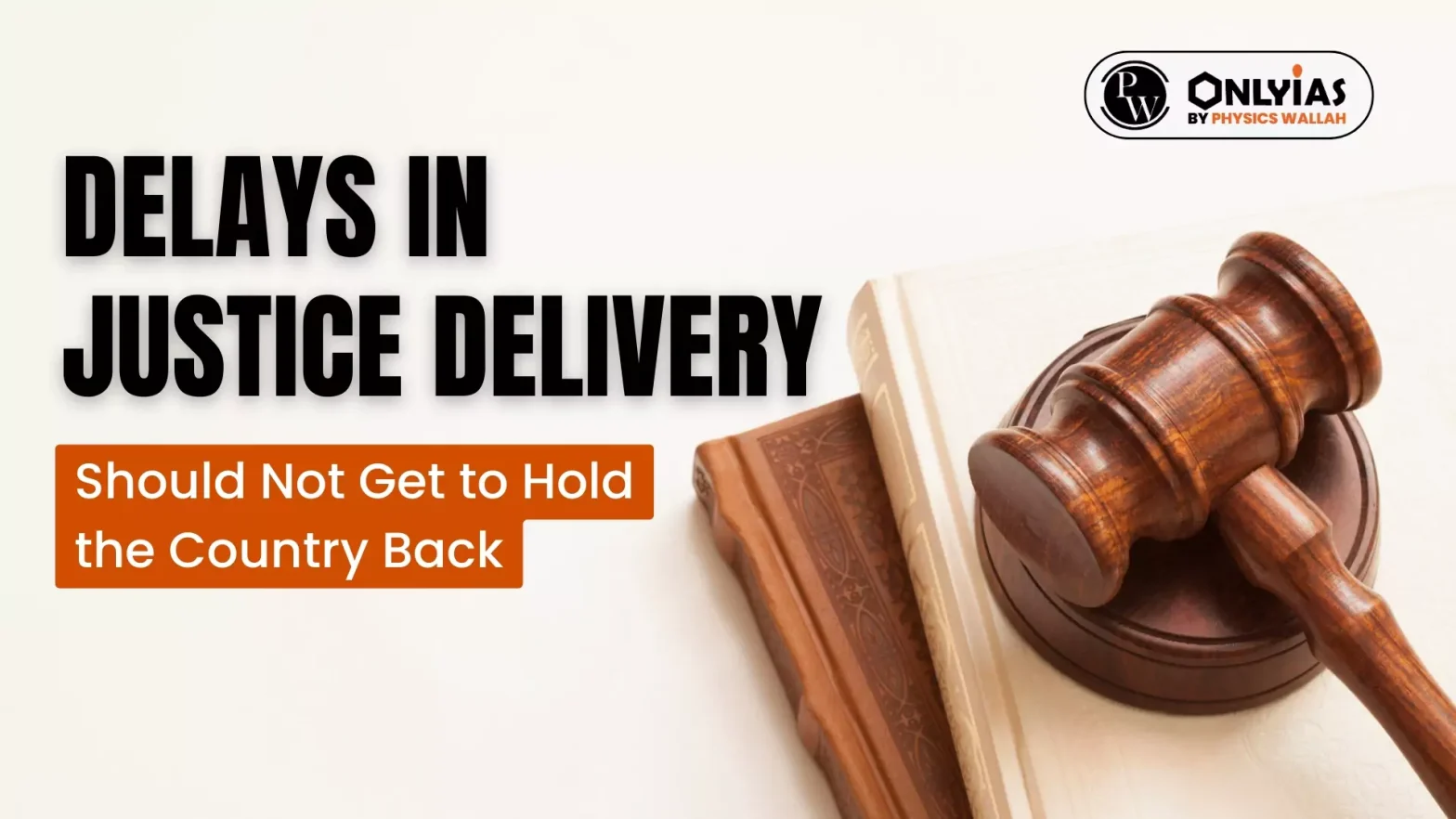Delays in justice delivery are among the biggest barriers in India to making it easier to do business and improving people’s ease of living.
| Relevancy for Prelims: National Judicial Appointments Commission Act (NJAC), Judge Appointments, National Litigation Policy, etc.
Relevancy for Mains: Issues in India’s justice delivery system, Reforms needed to address the problem of judicial delays, etc. |
Delays in Justice Delivery
- In a recent response, Union law minister Arjun Ram Meghwal informed Parliament that more than 50 million cases are pending in various courts across India, of which nearly 90% are in district and subordinate courts.
- This backlog not only burdens the judicial system, but also denies timely justice to millions of citizens, and the cost of it is borne not just by the economy, but by all of us.
- What the minister didn’t say was that another 50 million cases are pending in our tribunals, revenue boards, consumer courts, information commissions, etc.
Enroll now for UPSC Online Classes
- There are several reasons for this dismal state of affairs.
- Let us analyse what the government and judiciary must do to salvage the situation.
- In a majority of the cases, governments, both the Union and of states, are the main litigant.
- Fortunately, the Union minister has announced that a draft National Litigation Policy is to be formally adopted that will endeavour to bind all government parties to reduce litigation.
- A few states already have litigation policies, while Karnataka has a litigation law in place.
- Governments can and should ensure the availability of adequate infrastructure and staff, including running courts and tribunals with minimal breaks on a shift system, for the disposal of pending cases before they pile up any further.
- Governments should also support and establish alternate dispute settlement systems in association with the judiciary and quasi-judicial bodies, such as conciliation mechanisms, lok adalats, grameen nyayalays, etc, to reduce the burden on Indian courts and tribunals.
- This should be accompanied by disincentives to deter frivolous litigants.
- The tricky reform involves judge selection.
- Judges today are appointed to the apex and high courts by a collegium system that seems to keep doors largely closed.
- There are reports of judges being appointed in an opaque manner from among 350 ‘judicial families’ in India.
- Favouritism has also been alleged in some cases.
- This was sought to be addressed by the National Judicial Appointments Commission Act (NJAC), but that was struck down by the apex court, as it was found to go against the independence of the judiciary.
- Globally, judges are never the sole authority of appointing other judges.
- If at all they are involved in appointments, there are checks and balances.
- In India, the government was peeved with the NJAC Act being struck down, and judicial appointments have been delayed.
- The Act should be revived by Parliament, which is the supreme authority in the country, to reflect the will of the people. Better compensation should be offered to attract judges and a gender balance should be assured.
- It is mandatory for consumer courts, for example, to appoint one lady member along with a retired bureaucrat and district judge.
- In the case of lower courts, judges come from a state judicial service, while members of tribunals and adjudicatory commissions are appointed from among retired judges and bureaucrats.
- Here too, shortages and favouritism are problems.
- Most retirees seem to take it easy while discharging their duties and often don’t even meet their duty time requirements.
- This adds to delays.
- There is no effective supervision.
- The judiciary has privileges that are exclusive to it. For example, the colonial system of court vacations in summers and winters.
- After independence, we thankfully did drop the colonial legacy of wigs being worn, but did not drop the generous vacations that Raj-era judges took.
- This is in addition to casual and annual leave for judges.
- Like any other public institution, even our courts should work every day, except on public holidays.
- The argument that judging is highly stressful does not hold merit, as doctors, police officers and others work for significantly longer periods under conditions of stress.
- Frequent adjournments only add to delays.
- The rule of three adjournments at most is practised more in the breach.
- In a few cases, when judges got strict with this rule, lawyers agitated against it in various ways: boycotting courts, complaining against judges or even going on strike (which is illegal).
- The Supreme Court in Harish Uppal vs. Union of India (2003) categorically states that lawyers must not engage in strikes or abstain from court work under any circumstance.
- There is no court management system being followed in India.
- In developed countries, judges call the lawyers of both sides to agree on timelines right at the case- admission stage, so that cases are resolved within a pre-determined time frame as far as possible.
- Now with advanced technology, cases can be disposed of swiftly.
- The covid period has shown that cases can be heard and decided virtually.
- This would also help ease India’s court infrastructure problem to an extent.
- Comprehensive reforms in the justice delivery system are necessary to not just lighten the load on Indian courts, but also restore public confidence.
- In a country as diverse and populous as India, timely and efficient justice is essential to maintain social order and uphold democratic principles.
Check Out UPSC NCERT Textbooks From PW Store
Conclusion
Reforming India’s justice system requires enhancing infrastructure, adopting efficient case management, revising judge appointments, and leveraging technology to ensure timely, accessible, and fair justice for all.
![]() 6 Aug 2024
6 Aug 2024
